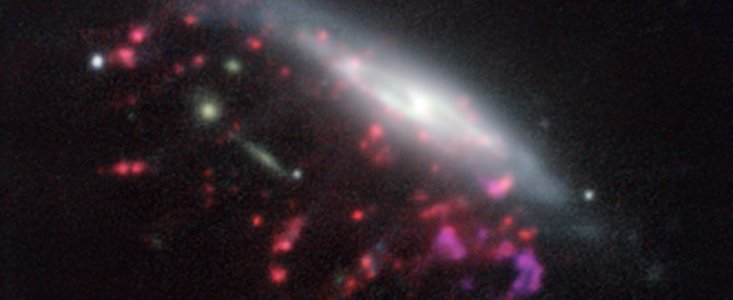Anuncio
Programa GASP recibe 2,5 millones de euros por parte del Consejo Europeo de Investigación
8 de Mayo de 2019
El Consejo Europeo de Investigación (ERC por sus siglas en inglés) le concedió una subvención de 2,5 millones de euros a la astrónoma Bianca Poggianti del Istituto Nazionale di Astrofisica para un proyecto basado en datos provenientes de las instalaciones de ESO. El programa GASP (GAs Stripping Phenomena in galaxies, fenómeno del desgarro del gas en galaxias) es uno de los 222 proyectos en Europa que han recibido la muy competitiva subvención avanzada, como anunció el ERC.
El proyecto GASP del ERC está basado en el gran programa de ESO del mismo nombre que estudia los mecanismos por los cuales se pierde el gas en las galaxias y sus consecuencias para la formación estelar. GASP usa una enorme cantidades de datos, muchos de los cuales fueron reunidos a través del instrumento MUSE del Very Large Telescope (VLT) de ESO, y también con ALMA y APEX. Según Poggianti, este uso de datos en una amplia variedad de longitudes de onda es un aspecto que hace único a GASP, permitiendo por primera vez que los astrónomos estudien diversas fases del gas y las estrellas, incluso estando muy lejos del centro de las galaxias. GASP también destaca por la combinación de un análisis físico altamente detallado, el poder estadístico de una gran muestra de objetos estudiados, y el desarrollo de métodos innovadores para estudiar la evolución del espectro de las galaxias en diferentes eras cosmológicas.
GASP se estableció en el 2015 y ya ha probado su eficacia; su primera publicación de datos fue en noviembre de 2017 e incluyó información valiosa como las tasas medias de formación estelar en 57 galaxias de distintos ambientes, y reveló una forma previamente desconocida de alimentar agujeros negros supermasivos. La segunda y final publicación de datos de GASP está prevista para mayo de 2019.
Esta subvención recientemente otorgada por el ERC permitirá que seis jóvenes investigadores se unan al equipo, apoyando al proyecto en marcha en su búsqueda de respuestas a preguntas relativas a las condiciones bajo las cuales se forman las estrellas, el rol del entorno de una galaxia al momento de “provocar” que los agujeros negros supermasivos se conviertan en núcleos de galaxias activos, y los procesos que detienen la formación estelar.
El ERC es la principal organización de financiación europea dedicada a la investigación de vanguardia de excelencia. Las subvenciones avanzadas del ERC se conceden a investigadores destacados y consolidados cuya institución anfitriona esté situada en un estado miembro de la UE o en un país asociado. Se apoyan los trabajos innovadores dándoles a los investigadores que cuentan con un historial de excelencia científica la oportunidad de perseguir sus mejores ideas.
Enlaces
Contactos
Calum Turner
ESO Public Information Officer
Garching bei München, Germany
Tel: +49 89 3200 6670
Email: pio@eso.org
Sobre el anuncio
| Identificador: | ann19024 |
Our use of Cookies
We use cookies that are essential for accessing our websites and using our services. We also use cookies to analyse, measure and improve our websites’ performance, to enable content sharing via social media and to display media content hosted on third-party platforms.
ESO Cookies Policy
The European Organisation for Astronomical Research in the Southern Hemisphere (ESO) is the pre-eminent intergovernmental science and technology organisation in astronomy. It carries out an ambitious programme focused on the design, construction and operation of powerful ground-based observing facilities for astronomy.
This Cookies Policy is intended to provide clarity by outlining the cookies used on the ESO public websites, their functions, the options you have for controlling them, and the ways you can contact us for additional details.
What are cookies?
Cookies are small pieces of data stored on your device by websites you visit. They serve various purposes, such as remembering login credentials and preferences and enhance your browsing experience.
Categories of cookies we use
Essential cookies (always active): These cookies are strictly necessary for the proper functioning of our website. Without these cookies, the website cannot operate correctly, and certain services, such as logging in or accessing secure areas, may not be available; because they are essential for the website’s operation, they cannot be disabled.
Functional Cookies: These cookies enhance your browsing experience by enabling additional features and personalization, such as remembering your preferences and settings. While not strictly necessary for the website to function, they improve usability and convenience; these cookies are only placed if you provide your consent.
Analytics cookies: These cookies collect information about how visitors interact with our website, such as which pages are visited most often and how users navigate the site. This data helps us improve website performance, optimize content, and enhance the user experience; these cookies are only placed if you provide your consent. We use the following analytics cookies.
Matomo Cookies:
This website uses Matomo (formerly Piwik), an open source software which enables the statistical analysis of website visits. Matomo uses cookies (text files) which are saved on your computer and which allow us to analyze how you use our website. The website user information generated by the cookies will only be saved on the servers of our IT Department. We use this information to analyze www.eso.org visits and to prepare reports on website activities. These data will not be disclosed to third parties.
On behalf of ESO, Matomo will use this information for the purpose of evaluating your use of the website, compiling reports on website activity and providing other services relating to website activity and internet usage.
Matomo cookies settings:
Additional Third-party cookies on ESO websites: some of our pages display content from external providers, e.g. YouTube.
Such third-party services are outside of ESO control and may, at any time, change their terms of service, use of cookies, etc.
YouTube: Some videos on the ESO website are embedded from ESO’s official YouTube channel. We have enabled YouTube’s privacy-enhanced mode, meaning that no cookies are set unless the user actively clicks on the video to play it. Additionally, in this mode, YouTube does not store any personally identifiable cookie data for embedded video playbacks. For more details, please refer to YouTube’s embedding videos information page.
Cookies can also be classified based on the following elements.
Regarding the domain, there are:
- First-party cookies, set by the website you are currently visiting. They are stored by the same domain that you are browsing and are used to enhance your experience on that site;
- Third-party cookies, set by a domain other than the one you are currently visiting.
As for their duration, cookies can be:
- Browser-session cookies, which are deleted when the user closes the browser;
- Stored cookies, which stay on the user's device for a predetermined period of time.
How to manage cookies
Cookie settings: You can modify your cookie choices for the ESO webpages at any time by clicking on the link Cookie settings at the bottom of any page.
In your browser: If you wish to delete cookies or instruct your browser to delete or block cookies by default, please visit the help pages of your browser:
Please be aware that if you delete or decline cookies, certain functionalities of our website may be not be available and your browsing experience may be affected.
You can set most browsers to prevent any cookies being placed on your device, but you may then have to manually adjust some preferences every time you visit a site/page. And some services and functionalities may not work properly at all (e.g. profile logging-in, shop check out).
Updates to the ESO Cookies Policy
The ESO Cookies Policy may be subject to future updates, which will be made available on this page.
Additional information
For any queries related to cookies, please contact: pdprATesoDOTorg.
As ESO public webpages are managed by our Department of Communication, your questions will be dealt with the support of the said Department.


